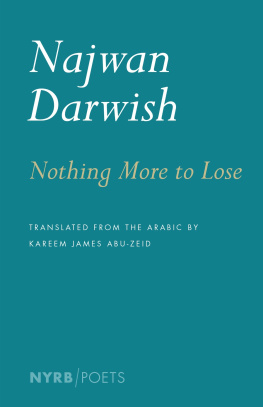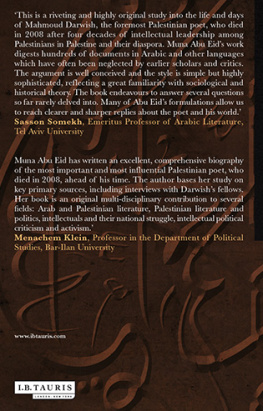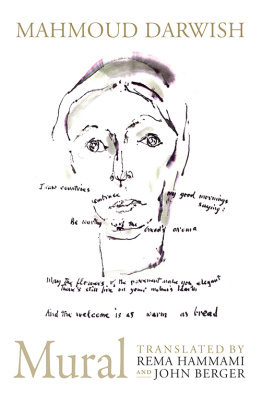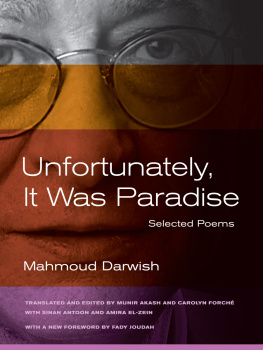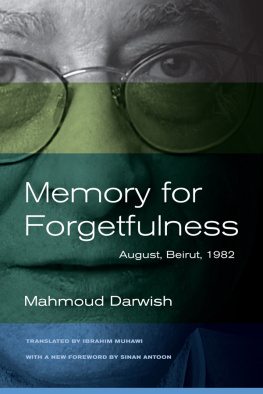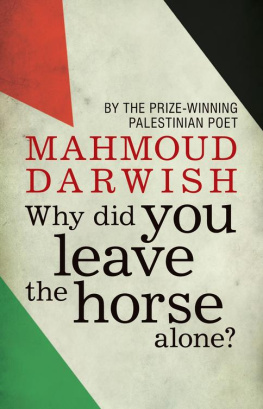N AJWAN D ARWISH , one of the foremost Arabic-language poets of his generation, was born in Jerusalem in 1978, exactly thirty years after his family was exiled from their home in the western part of the city. Shortly after studying in Amman, Jordan, and becoming a lawyer, Darwish decided to give up law and devote himself more fully to literature. He has worked as the editor of two cultural magazines in Palestine and was a cultural critic for the prominent Lebanese newspaper Al-Akhbar from 2006 to 2012. Darwish has been an organizer and advisor for many public arts projects, among them the Palestine Festival of Literature. In 2009, he founded a literary press in Jerusalem, and he is currently involved in establishing a new pan-Arab newspaper, where he will be the chief editor of the arts and culture section. Darwishs poetry is informed by Arabic and Western poetic traditions, both classical and modern, as well as by Persian Sufi poetry.
Since the publication of his first collection in 2000, his poetry has been acclaimed across the Arab world and has been translated into fifteen languages. In 2009 he was on the Hay Festival Beiruts list of the best 39 Arab authors under the age of 39. He currently resides in Jerusalem. K AREEM J AMES A BU- Z EID was born in 1981. Half American and half Egyptian, he has translated novels by the Lebanese writer Rabee Jaber and the Sudanese writer Tarek Eltayeb, as well the poetry collection The Iraqi Nights by Dunya Mikhail. Abu-Zeid also translates from French and German, and has taught university courses in four different languages in Berkeley, Mannheim, and Heidelberg.
He works as a freelance translator and editor, and is currently writing a history of psychedelic literature that is doubling as his PhD dissertation in comparative literature at the University of California, Berkeley.
Najwan Darwish Nothing More to Lose TRANSLATED FROM THE ARABIC BY KAREEM JAMES ABU-ZEID


NEW YORK REVIEW BOOKS New York THIS IS A NEW YORK REVIEW BOOK
PUBLISHED BY THE NEW YORK REVIEW OF BOOKS 435 Hudson Street, New York, NY 10014
www.nyrb.com Copyright 2000, 2012, 2013, 2014 by Najwan Darwish Translation and afterword copyright 2014 by Kareem James Abu-Zeid All rights reserved. Some of these poems first appeared in
Banipal 45: Magazine of Arabic Literature,
Index on Censorship,
Poetry International,
Left Curve, and
Poetry. Library of Congress Cataloging-in-Publication Data Darwish, Najwan. [Poems. Selections.
English] Nothing more to lose : selected poems / by Najwan Darwish ; translated by Kareem James Abu-Zeid. pages cm. (New York Review Books poets) Includes bibliographical references and index. ISBN 978-1-59017-730-3 (alk. paper) 1. I. I.
Abu-Zeid, Kareem James, translator. II. Title. PJ7920.A787A2 2014 892.7'17dc23 2013048994 Cover design by Emily Singer ISBN 978-1-59017-747-1
v1.0 For a complete list of books in the NYRB/Poets series, visit www.nyrb.com or write to:
Catalog Requests, NYRB, 435 Hudson Street, New York, NY 10014
TRANSLATORS AFTERWORD
Najwan Darwish was born in Jerusalem on December 8, 1978, exactly three decades after his family was exiled from their home in the western part of the city. When he turned ten, the First Palestinian Intifada was just beginning. Six years later, the Oslo Accords marked the start of the Peace Process erawhat Darwish later described as a process of immense political corruption.
Growing up under the Israeli Occupation instilled a deep sensitivity to injustice and oppression in the young Darwish, as well as a sense of rage and rebellion. I turned rebellion into poetry, he would later say, or rebellion turned me into a poet. In 1997 Darwish crossed the border to study law in Amman, Jordan, but abandoned the profession shortly after becoming a lawyer to devote himself more fully to writing. He published his first collection of poetry in 2000, and his poetry has been hailed across the Arab world and beyond as a singular expression of Palestinian resistance. Darwish has received various accolades over the years, and in 2009 he was on the Hay Festival Beiruts list of the best 39 Arab authors under the age of 39. He has engaged in the broader Palestinian cultural struggle in ways that extend well beyond writing as well: he has been an organizer and advisor for a large number of artistic projects, among them the Palestine Festival of Literature.
He has also been very active in the fields of publishing and journalism: he founded a literary press in 2009, and worked as a cultural critic for the prominent Lebanese newspaper Al-Akhbar from 2006 to 2012. He is currently involved in establishing a new pan-Arab newspaper, where he will be the chief editor of the cultural section. But every individual is much more than the sum of such biographical facts, and Darwish himself is of the opinion that biography is a kind of fiction or fabrication. In turning to Darwishs poetry, what quickly becomes apparent is that there is not one Najwan Darwish, but many voices, many different versions of the ever-present lyric I. Nothing More to Lose, Najwan Darwishs first collection of poetry to appear in English, presents a selection of the young poets work from 1998 to 2013. Readers will quickly discover that there is no typical Darwish poem, and that often one poem even seems to contradict the next.
I began translating Darwishs poetry in 2009, when the American poet Jack Hirschman invited him to participate in the San Francisco International Poetry Festivala festival he was unable to attend because of a delay in issuing his entry visa to the U.S. The complexity of his work posed an immediate challenge to me. As the translator of several different Arab poets and novelists, I have often faced the challenge of finding the right tone, of keeping the language consistent and unified as it is in the original. With Darwishs work Ive had to suppress this tendency, and instead consider each poem as its own singular entity. I am not translating one poet, butmany, I often told myself as I grappled withand learned to embracethe apparent inconsistencies in his poetry. I have come to realize that this wide range of voices is behind much of Darwishs remarkable success as a poet: no Palestinian has ever written poetry quite like this before.
While practically the whole of modern Palestinian poetry has, by force of circumstance, taken up the theme of resistance, Darwishs work has approached this in a new way, from multiple perspectives. He has written poems that evoke resistance in what might seem to be more traditional expressions of defiance against oppression. We see this in the poem I Will Rise One Day, which begins: I will rise one day and speak it / I, the Kurd, will rise one day / and speak it / I, the Amazigh, your voice / will rise one day. Yet even here Darwishs outlook is not limited to the Palestinian experiencethe indignation is more complex. This poem, while taking on an Arab perspective (which is far from unified), is also critical of Arab regimes, for they are the ones who have persecuted the Amazighs (in North Africa) and the Kurds (in Iraq, Syria, and elsewhere). Nothing escapes Najwan Darwishs relentless critical gazeneither dictatorial Arab regimes, nor the corruption of the political ruling class in Palestine, and certainly not the violence-laden discourse of fundamentalist groups.
Time and again he asks the reader: How can we possibly resist the Israeli occupation of Palestine without also criticizing the injustices that we Arabs are committing or allowing to happen?
Next page
